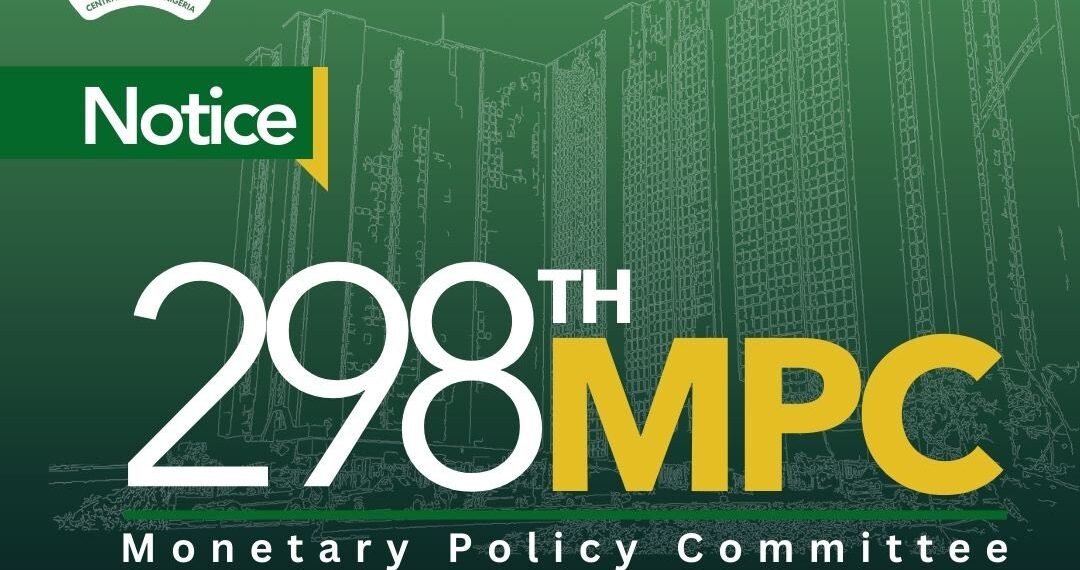The Central Bank of Nigeria (CBN) is gearing up for its 298th Monetary Policy Committee (MPC) meeting today, 25th November, 2024, a pivotal event that could set the tone for Nigeria’s economic direction in the coming months. With inflation rates soaring and economic stability hanging in balance, this meeting is under intense scrutiny from analysts, investors, and the Nigerian populace alike. Here’s what Nigerians might anticipate from this crucial session.
Inflation in Nigeria has been a persistent headache, with recent figures suggesting a continued upward trend. Analysts predict that the MPC might opt for further tightening of monetary policy, potentially increasing the Monetary Policy Rate (MPR) which has seen several hikes in previous sessions. This expectation is based on the CBN’s recent pattern of aggressive rate increases aimed at curbing inflation, which was last reported at around 33.69%. A higher MPR would mean banks have to pay more to borrow from the CBN, which could increase lending rates, thereby cooling down demand-driven price increases.
Exchange Rate Stability
The naira’s value has been fluctuating, and the MPC’s stance on the exchange rate policy will be eagerly awaited. While there’s no direct indication from recent meetings, the trend has been towards a more flexible exchange rate regime, which has historically been used to manage currency pressures. However, with the backdrop of persistent foreign exchange liquidity issues, the CBN might either reinforce its current flexible approach or introduce measures to stabilize the naira, perhaps through increased dollar liquidity or tighter controls on forex markets.
Liquidity and Credit Control
Given the economic climate, the MPC might review or adjust the Cash Reserve Ratio (CRR) and Liquidity Ratio. These tools are crucial for managing the money supply in the economy. An increase in these ratios would mean banks must hold more cash reserves, reducing the amount they can lend out, which in turn could help in controlling inflation by limiting credit expansion. The last meeting saw a significant hike in CRR, suggesting that the CBN is not shy about using these levers to influence economic conditions.
Economic Growth vs. Inflation
A critical discussion point will likely be the balance between curbing inflation and fostering economic growth. The MPC has historically acknowledged this trade-off, but recent comments from CBN Governor Olayemi Cardoso indicate a firm commitment to inflation control, even if it means slower growth in the short term. The committee might weigh whether to continue with a hawkish policy or if there’s room for slightly more accommodative measures to stimulate economic activity without igniting inflation further.
Read also: Ebonyi govt slams PDP over criticism of Airport Runway inauguration
Sector-Specific Impacts
An increase in interest rates has significant implications across various sectors of the economy. For businesses, the higher borrowing costs could hinder investments and expansion plans, particularly for small and medium-sized enterprises (SMEs) that are more sensitive to credit costs. This could lead to slower growth and reduced job creation within this critical segment of the economy.
For consumers, the tighter monetary policy may result in more expensive loans, mortgages, and credit facilities. This could reduce disposable income, limit purchasing power, and ultimately dampen consumer spending, which is a key driver of economic growth.
Investors, both domestic and foreign, may experience higher returns on their investments in Nigeria due to elevated interest rates. However, the increased cost of capital could act as a deterrent for initiating new ventures or expanding existing projects, potentially slowing down economic development and innovation in the long term.
Public and Market Expectations
The public and market participants will be watching for any signals on policy direction, particularly how the CBN plans to address the rising cost of living and economic instability. There’s a call for clearer communication from the CBN regarding its strategies, as uncertainty has previously led to speculative and volatile market behaviors.
While the exact outcomes of the 298th MPC meeting are speculative, the overarching expectation is for a continued or even intensified focus on inflation control. Nigerians can anticipate more stringent monetary policies aimed at stabilizing prices, though at the potential cost of economic growth in the short term. The decisions made here will not only affect immediate economic indicators but also set the stage for Nigeria’s economic narrative in the following year.
As always, the MPC’s decisions will be closely scrutinized for their implications on everyday life, business operations, and Nigeria’s position in the global economic landscape.






